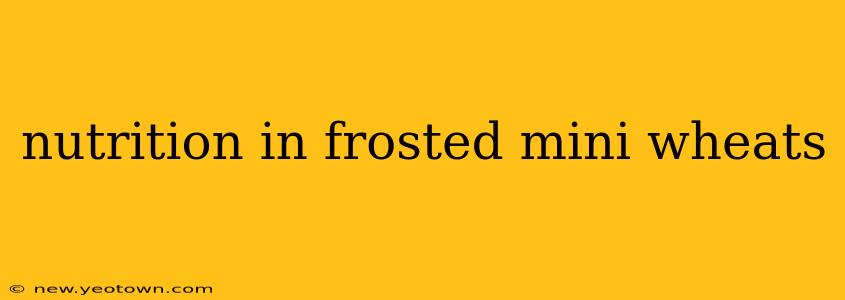Let's be honest, the enticing sugary scent of Frosted Mini-Wheats has lured many of us to the breakfast table. But beyond the delicious crunch, what's the real nutritional story behind this beloved cereal? This isn't just about calories; we'll unpack the complete nutritional profile, addressing common questions and helping you decide if this breakfast staple fits into your healthy eating plan.
What are the nutritional benefits of Frosted Mini-Wheats?
This is where things get interesting. While not a nutritional powerhouse like, say, a bowl of oatmeal brimming with berries, Frosted Mini-Wheats do offer some positive nutritional aspects. They're a source of whole grains, contributing to your daily fiber intake. Fiber is crucial for digestive health, helping regulate bowel movements and promoting feelings of fullness, which can aid in weight management. They also provide some iron and a few essential vitamins and minerals, although the amounts are relatively modest.
How many calories are in a serving of Frosted Mini-Wheats?
This depends on the serving size. A typical serving, as indicated on the box, usually contains around 190-200 calories. However, let's be realistic; most of us don't meticulously measure out a single serving. The calorie count quickly escalates if you enjoy a larger bowl. Keeping an eye on portion sizes is key to managing your overall calorie intake.
Are Frosted Mini-Wheats a good source of fiber?
Yes, relatively so. A serving of Frosted Mini-Wheats offers a decent amount of fiber compared to other refined breakfast cereals. This fiber content contributes to that feeling of satiety we mentioned earlier, helping you stay full and energized throughout the morning. Remember, fiber plays a crucial role in maintaining a healthy digestive system.
How much sugar is in Frosted Mini-Wheats?
This is where the "frosted" part comes into play. Frosted Mini-Wheats do contain a significant amount of added sugar. The sugar content varies slightly depending on the specific product, but it's generally higher than many other whole-grain cereal options. While a little sugar isn't inherently bad, it's important to be mindful of your overall sugar intake as part of a balanced diet. Moderation is key.
Are Frosted Mini-Wheats healthy for weight loss?
This is a complex question with no simple yes or no answer. While the fiber content can help with satiety, the added sugar and relatively high calorie count can hinder weight loss efforts if consumed in excess. To incorporate Frosted Mini-Wheats into a weight loss plan, you'd need to be conscious of portion sizes and consider it as part of a balanced diet that includes plenty of fruits, vegetables, lean protein, and whole grains.
What are the ingredients in Frosted Mini-Wheats?
The ingredient list varies slightly between different Frosted Mini-Wheats products, but typically includes whole grain wheat, sugar, corn syrup, salt, and various vitamins and minerals. Always check the specific packaging for the most accurate and up-to-date ingredient information.
What are some healthier alternatives to Frosted Mini-Wheats?
If you're looking for a healthier breakfast cereal, consider options with less added sugar and a higher fiber content. Oatmeal, for instance, is a fantastic source of fiber and can be customized with various healthy toppings. Other whole-grain cereals with lower sugar levels provide a more nutritious start to your day.
The Bottom Line:
Frosted Mini-Wheats offer a pleasant taste and some nutritional benefits like fiber, but they're not a perfect health food. Their sugar content is notable, and portion control is crucial. The best approach is to enjoy them in moderation as part of a balanced and varied diet. Remember to always read food labels carefully and make informed choices that align with your individual health goals.

